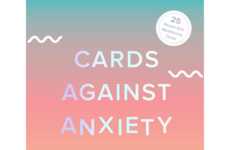
'The Little Book of Disorders' Helps Make Discussing Mental Illness Easier
Katherine Pendrill — June 10, 2015 — Lifestyle
References: kickstarter & refinery29
Discussing mental illness can be difficult for many people, which is why Kim Caicedo launched a crowdfunding campaign for her new book about mental health. Caicedo explains she came up with the idea for the book after realizing that there was a lack of public awareness about "what these disorders are or how to talk about them in ways that are easy to understand." Her book is called 'The Little Book Of Disorders' and it is designed to be a helpful tool for breaking down conversational barriers and fighting the stigma surrounding mental illness.
The book is modeled on the 'Diagnostic and Statistical Manual of Mental Disorders,' but it is designed to be more accessible for the general public. Looking at eight specific disorders in particular, Caicedo uses simple language and non-scientific terms to help educate readers. She also includes motivational sayings and tips for discussing mental illness more openly with friends and family.
The book is modeled on the 'Diagnostic and Statistical Manual of Mental Disorders,' but it is designed to be more accessible for the general public. Looking at eight specific disorders in particular, Caicedo uses simple language and non-scientific terms to help educate readers. She also includes motivational sayings and tips for discussing mental illness more openly with friends and family.
Trend Themes
1. Mental Health Education - Creating easily accessible educational resources for mental health can help break down barriers and reduce stigma.
2. Democratization of Information - Making complex information more accessible to the general public can empower individuals to take charge of their own health and wellness.
3. Stigma Reduction - Developing resources that help reduce the stigma surrounding mental illness can improve the lives of individuals affected and promote a more inclusive society.
Industry Implications
1. Publishing - Innovative educational materials on mental health can be developed for both print and digital formats, with a focus on creating accessible content.
2. Healthcare - More accessible and democratized information about mental health can empower patients to take ownership over their health and wellness, as well as reduce stigma and encourage open discussion with healthcare providers.
3. Technology - Digital tools, such as apps and online platforms, can be developed to make mental health education more accessible and reduce the stigma surrounding mental illness.
2.5
Score
Popularity
Activity
Freshness























